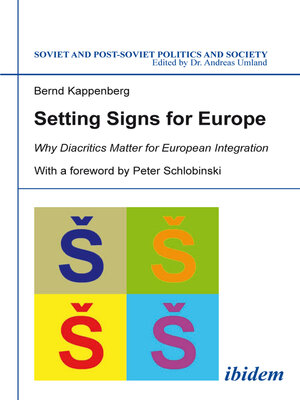Setting Signs for Europe
ebook ∣ Why Diacritics Matter for European Integration · Soviet and Post-Soviet Politics and Society
By Bernd Kappenberg

Sign up to save your library
With an OverDrive account, you can save your favorite libraries for at-a-glance information about availability. Find out more about OverDrive accounts.
Find this title in Libby, the library reading app by OverDrive.



Search for a digital library with this title
Title found at these libraries:
| Library Name | Distance |
|---|---|
| Loading... |
More than 20 years have passed since the introduction of the Universal Character Set. However, legacy applications still cannot even render German umlauts correctly. Part of this problem is a hidden political agenda: Consciously or unconsciously, patterns of the Cold War are continued in the interaction between Western and Eastern European languages. This book examines the current use of diacritical marks in Western Europe, such as the use of names from Slavic languages in electronic data processing systems. The role of the media as multiplier receives particular attention, with most error examples taken from actual media coverage. Considering international, EU, and national law and referring to landmark court decisions, Kappenberg answers the question: 'Is there a right to diacritical marks in people's names?' This is followed by a description of current practice in several European countries. Finally, Setting Signs for Europe answers the question how in the framework of the EU's multilingualism policy, effective approaches can be created to raise awareness among software vendors, the media, government agencies, and individuals regarding the correct handling of diacritics. Kappenberg also assesses the use of diacritics as a style element and offers an improved input method for diacritics.







